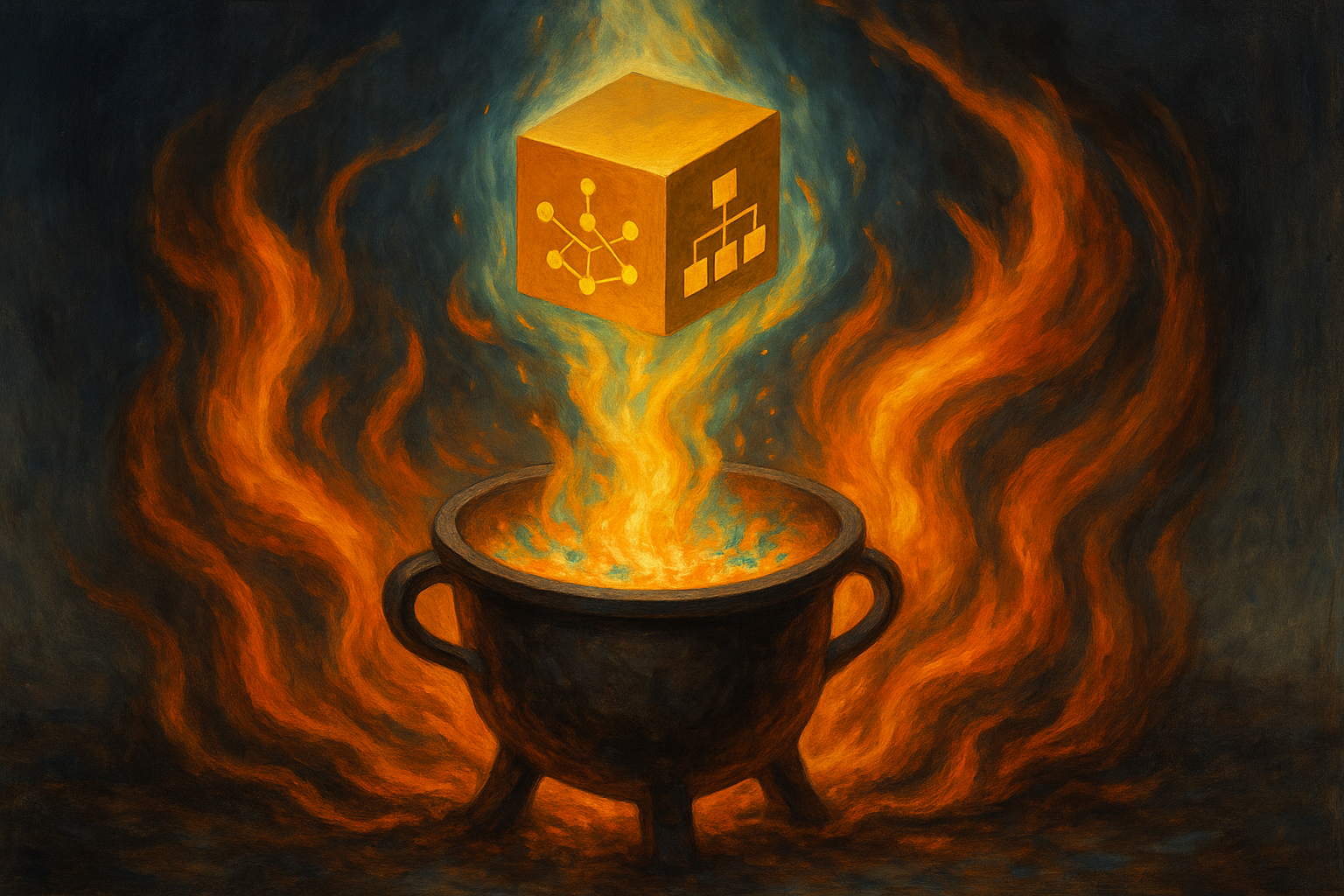Why facilitation is the missing link in Transformation — and what to do about it!
As I continue to scale Teamvine, I’ve been immersed in conversations with dozens of global and multinational organisations — from energy giants and pharmaceutical leaders to financial institutions, construction, Manufacturing and Engineering companies, not to forget several public sector bodies. Despite their differences, they share two urgent, unrelenting realities:
- The pressure of digital transformation.
- The expectation to deliver more and more… with less and less.
Sound familiar?
To me, it sounds like alchemy.
Not the medieval fantasy — but the modern kind.
A volatile mix of chemistry, complexity, pressure, and potential.
A crucible where we try to transform organisational base metal — bureaucracy, misalignment, siloed teams — into something far more valuable:
⚗️ Clarity. Collaboration. Change-readiness. Gold.
And at the centre of that transformation?
A craft too often misunderstood and undervalued.
💡 Facilitation.
Not a soft skill. A strategic one.
“Only 20% of organisations believe they are ready to address the human side of transformation at scale.” — McKinsey & Co.
Let that sink in!
In a world surging with AI tools, digital roadmaps, and quarterly sprints toward “future-readiness,” only one in five organisations feels confident handling the human part of change.
The part that makes the difference between process and progress.
Now add this:
“Executives who foster cross-functional collaboration through digital learning tools are 1.6x more likely to report successful transformation outcomes.” — Deloitte Human Capital Trends
In short: transformation isn’t about tech stacks. It’s about team dynamics.
And the missing catalyst?
It’s not another communication cascade.
It’s not another tool.
It’s someone who knows how to hold the heat long enough for real change to emerge.
That someone is a facilitator.
The future isn’t just digital. It’s Experiential!
As we have all been reading in the plethora of socials on future skills, The World Economic Forum’s Future of Jobs report names analytical thinking, emotional intelligence, resilience, collaboration, and leadership among the top skills for 2030.
What do they all have in common?
They don’t live in playbooks. They’re forged in experience — in real, raw, reflective learning environments.
Alchemy isn’t taught.
It’s triggered — by tension, by experimentation, by insight.
That’s where facilitation becomes a transformational technology. It doesn’t just transfer knowledge. It creates conditions. It holds the crucible where people grow.
Facilitation is the Leadership capability you can’t afford to ignore!
Love him or loath him, Steve Jobs didn’t call himself a facilitator and yet that’s exactly what he was. He held the space for brilliance, provoked deep thinking, and turned creative friction into game-changing insight.
David Kolb gave us the science behind it; his experiential learning cycle shows that sustainable learning comes not from information, but from experience → reflection → insight → application.
I am a lifelong fan of Peter Senge and in particular his Fifth Discipline Field Book, which taught us that learning isn’t a solo pursuit. It’s a system function. If transformation is a fire, then facilitation is the oxygen. He reminded us that organisations learn when people reflect together — across boundaries, across functions — and when shared understanding becomes the fuel for adaptation.
But what about the invisible dynamics that block learning before it even begins?
That’s where the work of Chris Argyris and Edgar Schein becomes essential.
Argyris introduced the idea of defensive routines — the subtle ways we protect ourselves from embarrassment, vulnerability, or real reflection.
He warned that many organisations reward surface-level agreement while avoiding the deeper questions that reveal faulty assumptions.
“The most common cause of failure in learning is the behaviour we use to protect ourselves from learning.” — Chris Argyris
True facilitation surfaces those hidden patterns.
It doesn’t just smooth over resistance — it uses it.
Meanwhile, Schein brought forward the concept of humble inquiry: leadership through curiosity, not control. I call that “appreciative inquiry” underpinned by a restless curiosity.
Facilitators inspired by Schein don’t show up with answers — they ask better questions, build trust, and create psychological safety.
“Help involves listening more than advising.” — Edgar Schein
Together, Argyris and Schein show us that facilitation is not performance.
- It’s presence.
- It’s not persuasion.
- It’s process.
The result?
- Teams that think for themselves.
- Cultures that learn in motion.
- And organisations that adapt from the inside out.
Gallup’s Data: The cost of not Facilitating
According to Gallup:
- Only 23% of employees globally are engaged at work.
- $8.8 trillion is lost each year due to disengagement.
Let’s call this what it is: an epidemic of untapped potential.
When people are not invited to shape the future, they resist it.
This isn’t a motivation gap — it’s a design flaw.
It’s not that employees don’t care. It’s that no one has facilitated the kind of dialogue that helps them see their role in the story.
Teamvine: The Platform for Modern Alchemy
At Teamvine, we didn’t build another learning system.
We built a digital facilitation engine for transformation.
A multiplayer, experiential, insight-rich platform that:
- 🎯 Creates real-time, psychologically safe pressure-tested team simulations.
- 🔄 Anchors learning in Kolb’s cycle and Senge’s systems thinking.
- 📊 Surfaces behavioural patterns you can’t see in static training.
- ⚗️ Generates the kind of insight that turns tension into transformation.
This is what we mean by Organisational Alchemy:
- Culture becomes visible.
- Assumptions get tested.
- Mindsets shift.
- And learning sticks — because it was felt before it was understood.
If you’re a CPO, L&D Leader, or Transformation Executive trying to drive real change — not just run another programme — this is your crucible.
One Final Question:
“What if your next transformation initiative wasn’t something done to people…
but something co-facilitated with them?”
The future belongs to organisations that can metabolise pressure into progress.
That know how to hold heat without burning out.
That turn raw experience into collaborative wisdom.
The future belongs to alchemists.
